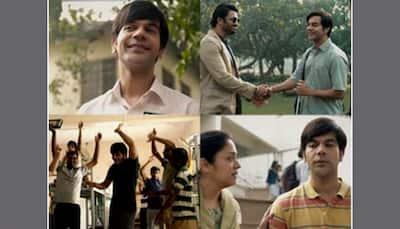
In a world where cinema serves as a lens into the myriad spectacles of life, this week’s release ‘Srikanth’ strides into theaters, casting a compelling reflection. Directed by Tushar Hiranandani, this biographical narrative unfolds the life journey of Srikanth Bolla, a visually impaired industrialist, who not only surmounted the odds stacked against him but also paved the way for others like him. The film brings together a stellar ensemble cast with Rajkummar Rao portraying Srikanth, while Jyotika, Alaya F, and Sharad Kelkar complement as pivotal characters.
Dramatized with a runtime of 134 minutes, ‘Srikanth’ begins in the humbling cradle of Seetharamapuram village in Machilipatnam, Andhra Pradesh. The harbinger of the challenges to come is perceived at the birth of Srikanth, named by his father (Srinivas Beesetty) after the cricketer Krishnamachari Srikkanth. Overcoming the initial crestfallen realization of their son’s visual impairment, the parents witness with pride as young Srikanth (Arnav Abdagire) blossoms, outshining his peers with his exceptional learning skills. The child’s stoic silence in the face of mockery shapes a resilient spirit, unshaken by his bullies.
As Srikanth progresses to a school for the visually challenged in Hyderabad, his encounter with teacher Devki (Jyotika) marks the inception of an unshakeable bond and an impetus to face life’s battles. His education journey sees litigation when Srikanth’s ambition to study science meets institutional resistance. A memorable courtroom scene spotlights Srikanth’s analytical prowess, challenging the established assumptions about disability and intellectual potential.
From these local battles to the global stage, Srikanth’s persistence lands him at the revered corridors of MIT’s Sloan School of Management. The narrative cleverly intersperses this portrayal of determination with an episode of Srikanth’s disallowed solo plane boarding. Deploying his comprehensive knowledge of the aircraft, moving beyond the bastions of limitation is affirmed and celebrated.
Upon his return to India in 2012, Srikanth’s mission shifts outward – endeavoring to create job opportunities for the visually impaired. His enterprise stands as a testament to inclusive employment and eco-friendly production, mirroring his academic excellence and pioneering vision.
The cinematic rendition of such an inspiring true story hinges greatly on the prowess of its lead. Rajkummar Rao, with his precise mimicry of gestures, body language, and speech patterns, becomes Srikanth. His portrayal is seamless to the extent that any semblance of Rao, the actor, nearly vanishes. However, it is in its keenness to amplify Rao’s skilled performance that the film’s direction wavers slightly, leading to a focus more on performative aspects than the organic narrative flow.
Supporting Rao’s lead is Jyotika as the nurturing teacher, while Sharad Kelkar exudes a solid presence as the industrialist ally. A sparing use of background melodies underscores the emotional tapestry of the film with ‘Papa Kehte Hain’, a score by Anand Milind invoking a wave of nostalgia from the archives of Bollywood.
The cinematographic aspects, handled adeptly by Pratham Mehta, and a score orchestrated by Tanishq Bagchi and Anand Milind, round off the sensorial dimensions of the film. Rated three stars by IANS, ‘Srikanth’ is Tushar Hiranandani’s more mainstream directorial venture following successful projects ‘Saand Ki Aankh’ and ‘Scam 2023’ on OTT platforms.
Ultimately, ‘Srikanth’ positions itself as a beacon of motivation, illustrating a story of indefatigable will and triumph. It resonates not just as a tale of personal victory but as an inspiration that kindles hope and evokes the power of human potential amidst adversities. Its release is not merely an addition to this week’s cinematic roster but a narrative offering of upliftment and the indomitable spirit of one visionary entrepreneur.










